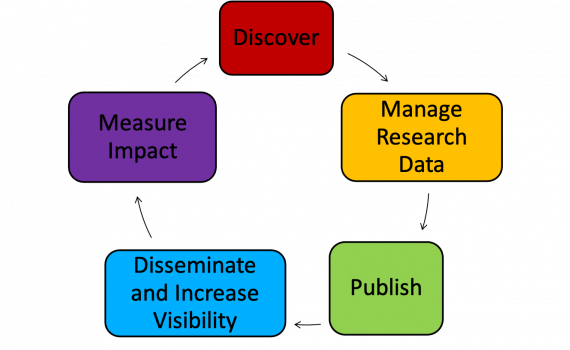
Just over 50% of academic librarians in developing and transition economy countries who responded to an EIFL survey have used the EIFL Digital Research Literacy Training Programme Outline for Librarians to train faculty, students and other librarians in digital literacy skills.
We developed the EIFL Digital Research Literacy Training Programme Outline for Librarians in 2020, and updated it in 2021, to enable academic librarians to support researchers and students to produce quality research output. Content in the training programme outline is organized according to the research cycle - Discover, Manage Research Data, Publish, Disseminate and Increase Visibility, and Measure Impact.
Providing digital literacy training for researchers is a key role of academic librarians, and we conducted the survey to find out if our training programme outline was achieving its goal of supporting their training.
The survey results are extremely positive. Seventy-seven librarians from 23 countries responded to the survey, and 51% of respondents (40) say they have used the training programme outline. Of these, the majority have used it either as an important primary source when conducting training, or as an additional source.
People trained include library staff, professors, senior researchers and researchers, post-graduate students (PhD and Masters level) and undergraduates -
“We use the EIFL Digital Research Literacy Training Programme Outline for Librarians in our professional development of the library staff (in-house training). After that our librarians can pass this obtained knowledge on to the library users in their native language, Latvian.” - Librarian from Latvia.
“I have used it to train interns and junior researchers. I have also used it to assist senior researchers with their data management plans.” - Librarian from South Africa.
“I used it to train academic staff in identifying predatory journals.” - Librarian from Uganda.
“I used it to assist Masters' Degree students in research and thesis writing.” - Librarian from Kenya.
The outline is useful for training across various topics, from basic use of search engines to more complex digital literacy and research skills -
“I took the learners through the ‘Use of Google Scholar’ to find academic information and also how to identify various freely available research resources and specialist search engines, tools, and resources to locate theses, freely available articles, books, images, newspapers, statistics, and datasets.” - Librarian from Kenya.
“We acquainted trainees to appropriately select a topic for their research, and we advised trainees to collect background information about their topic. We also showed them how to define their topic as a focused research question. And finally, we trained them on how to perform a literature review.” - Librarian from Ethiopia.
Some of the librarians are adapting and localizing the content and resources -
“We used it as a supplement mainly because our audience is non-English speaking. We needed to find some Russian-language resources or translate some materials. In the future, we plan to use it widely for open access and research management training.” - Librarian from Kyrgyzstan.
“I used it as a framework as I added local issues to make it more practical for my audience at the workplace.” - Librarian from Ghana.
“The PowerPoints shared were quite helpful. Just did a little modification.” - Librarian from Kenya.
Some are using the training programme outline to build their own digital literacy expertise so that they can share knowledge or improve their daily tasks -
“I studied it in order to improve my own information on open access to share with other colleagues.” - Librarian from the Republic of Moldova.
“I use it as a supplement for my work.” - Librarian from Ghana.
“I am using it to develop literacy training programmes for our users. It has been an eye-opener for me and I am learning a lot from it.” - Librarian from Kenya.
And the training programme outline won praise for being comprehensive -
“The key features are available in the EIFL programme. The concept of search techniques for e-content; open education resources; institutional repositories; publishing and choice of appropriate journals; Google Scholar profiles and ORCID IDs for visibility as well as academic integrity - citations/referencing and plagiarism issues. It is vitally important for information professionals in the 21st century.” - Librarian from Kenya.
“The content is methodical for consulting. And an inspiration.” - Librarian from the Republic of Moldova.
Download the revised and updated version (August 2021) of the training programme outline.
SHARE / PRINT









